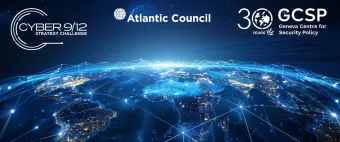Team PhishTank from University ETH Zurich wins the 11th Geneva Cyber 9/12 Strategy Challenge

Team PhishTank from University ETH Zurich wins the 11th Geneva Cyber 9/12 Strategy Challenge
Team PhishTank from University ETH Zurich is the winner of the 2025 Geneva Cyber 9/12 Strategy Challenge, co-organised by the Geneva Centre for Security Policy and Atlantic Council
This two-day virtual event took place on 10-11 April 2025. 27 teams were selected, comprised of nearly 150 competitors and coaches. As the most international edition of the Cyber 9/12 Strategy Challenge series, this year’s Geneva competition involved competitors from 33 academic institutions in 16 countries including Belgium, Botswana, France, Germany, Italy, Kazakhstan, Namibia, Nigeria, Norway, Philippines, Serbia, Sweden, Switzerland, the United Kingdom and the United States.
Three teams competed in the third and final round:
- Team Ephex from EPFL Cyber Group
- Team Norwegian Cyber Rangers from Norwegian University of Science and Technology
- Team PhishTank from ETH Zurich
The Geneva Cyber 9/12 challenges university students to respond to an evolving cyber crisis scenario in real-time. This year’s scenario revolved around a satellite jamming attack caused by a cyber intrusion via an insider, disrupting GPS and critical infrastructure, and sparking geopolitical tensions, disinformation, and escalation risks. Over the two days, the teams had to quickly respond to new developments and offer policy recommendations to a panel of seasoned cybersecurity experts, who served as judges and role-played as the leadership of ESA (the European Space Agency). The students were assessed based on the quality of their proposals, analysis, creativity and presentation skills.
Team awards:
- Best Oral Presentation: Team W0lV3R1NES, Utah Valley University
- Best Teamwork: Team CyberSec Policy Girls, Nigerian Law School
- Most Creative Policy Recommendation: Team ChaGU, Chalmers University of Technology
- Best Decision Document: Team EPHEX, EPFL
More than 40 seasoned cybersecurity professionals participated as judges. They include:
- Mr Klée Aiken, Director, Community and Capacity, FIRST, New Zealand
- Dr Carlos Anastasiades, Senior Manager, KPMG, Switzerland
- Mr Robin Andreasson, Manager, KPMG, Sweden
- Dr Laban Bagui, Senior Research Fellow, Cybersecurity Capacity Centre for S. Africa, South Africa
- Mr Diogo Carapinha, Consultant and Deputy Coordinator, VisionWare Threat Intelligence Center, Portugal
- Mr Joseph Carson, Chief Security Researcher, Wiretrap, Estonia
- Mr Aapo Cederberg, Chairman of the Board, Cyberwatch, Finland
- Dr Rafik Chaabouni, Cyber Security Architect, Swiss Armed Forces Staff, Switzerland
- Mr Dimitri Chichlo, CEO and Owner, AndSecure, Switzerland
- Dr Alix Desforges, Chief Project Manager, GEODE Research and Training Centre, France
- Dr Amy Ertan, Cyber and Hybrid Policy Officer, NATO, Belgium
- Mr Simone Fortin, Global CISO, MSC Cruises, Switzerland
- Ms Jessica Garpvall, Senior Cyber Security Consultant, Implement Consulting Group, Denmark
- Ms Jeffrey Gormley, Deputy for Customer Engagement, Diplomatic Technology (DT), Switzerland
- Colonel Gunther Godefridis, Cyber Command Director Development and Readiness, Ministry of Defence of Belgium, Belgium
- Mr Janne Haldesten, CSO, Sectyne, Sweden
- Dr Sven Herpig, Lead Cybersecurity Policy and Resilience, interface, Germany
- Mr Sylvain Hirsh, Cyber Strategy Senior Consultant, Mandiant, Google Cloud, Singapore
- Ms Aglika Klayn, Information Management and Governance Specialist, Europol, Netherlands
- Mr Nick Kock, Head of Cybersecurity and Technology Office, Absa Regional Office Cape Town, South Africa
- Ms Sonia Kumar, Senior Manager, Cyber Defence Incident, Vodafone Group Ltd, United Kingdom
- Ms Camilla Lundahl, CEO, Cyrenity AB, Sweden
- Prof. Clara Maathuis, Assistant Professor, Open University of the Netherlands , Netherlands
- Ms Eunice Maingi, Manager, IT Security Unit, University of Strathmore, Kenya
- Ms Rebecca Mikova, Project Officer, DCAF – Geneva Centre for Security Sector Governance, Switzerland
- Mr Inge O. Moen, Senior Advisor, Norwegian University of Science and Technology, Norway
- Mr Valentin Mulder, Scientific Project Manager, Federal Department of Defence, Switzerland
- Ms Simin Nadjm-Tehrani, Professor, Department of Computer and Information Science, Linköping University, Sweden
- Mr Smit Nayak, Network Admin Assistant, Montclair State University, United States
- Dr Brett van Niekerk, Senior Lecturer, Durban University of Technology, South Africa
- Ms Mercy Omollo, Director ICS and Technology Risk Profile and Governance, Standard Chartered, Kenya
- Dr Maria Papadaki, Associate Professor in Cyber Security, University of Derby, Ireland
- Ms Cecilia Popa, Experts Lead, EU CyberNet, Romania
- Dr Jody Prescott, Adjunct Faculty Member, University of Vermont, United States
- Dr David Rubens, Executive Director, Institute of Strategic Risk Management, United Kingdom
- Ms Zainab Ruhwanya, Cybersecurity Lecturer and Researcher, University of Cape Town, South Africa
- Mr Daniel Seiler, Head of Platform Services, Swiss National Cyber Security Centre, Switzerland
- Mr Nick Small, Cybersecurity Advisor, HND Consulting Ltd, United Kingdom
- Ms Merili Soosalu, LAC Regional Programme Lead, EU CyberNet, Estonia
- Dr Paul de Souza, Director, Cyber Security Forum Initiative, United States
- Ms Laura Temesi, Head, OTCR, Cyber & Tech Risk Profile & Governance, Standard Chartered, Kenya
Several ceremonies and side events took place in parallel with the competition. Mr Mark Scott, Senior Resident Fellow at the Digital Forensic Research Lab, Atlantic Council, kicked off the event with a keynote speech. Two expert discussions took place on the first day, “AI, Cyber and Disinformation under Geopolitical Competition” and “Space - The Final Frontier, and Cyber (In)secure”. Cyber and space professionals came together to provide insights into today’s top issues in cybersecurity.
On Day 2, Ivan Ureta, Director of the Executive Education Department, moderated a panel discussion on careers in cybersecurity. Finally, Mr Nick Small moderated the “Scenario Masterclass” panel, where judges weighed in on this year’s fictional cyber crisis.
The event closed with a keynote address by Ms Lennig Pedron, CEO of the Trust Valley Initiative, before the winners were announced by the Competition Director, Dr Gazmend Huskaj. Ms Safa Shahwan Edwards closed the ceremony with a keynote address.
The following 26 teams participated (alphabetical order):
- Team 0dayCERT, ICT College of Vocational Studies, Serbia
- Team Amies, Suleyman Demirel University, Kazakhstan
- Team ChaGU, Chalmers University of Technology, United States
- Team CS, Columbia University, United States
- Team Ctrl+Alt+Defend, University of the Bundeswehr, Germany
- Team CYB-INT, University of Trento, Italy
- Team CyberGuardians, Botswana Accountancy College, Botswana
- Team Cyberia, ETH Zurich, Switzerland
- Team CyberSec Policy Girls, Nigerian Law School, Nigeria
- Team EPHEX, EPFL Innovation Park, Switzerland
- Team FUTO, Federal University of Technology Owerri, Nigeria
- Team Interceptors, University of Novi Sad, Serbia
- Team Madrigal, Sciences Po Paris, France
- Team Node Nexus, Botswana Accountancy College, Botswana
- Team Nordic Nighthawks, Swedish Defence University, Sweden
- Team Norwegian Cyber Rangers, Norwegian University of Science and Technology, Norway
- Team Od1NCy, University College London, United Kingdom
- Team Philippines Public Safety College, Philippines Public Safety College, Philippines
- Team PhishTank, ETH Zurich, Switzerland
- Team SecWolves, University of Belgrade, Serbia
- Team Starr, Tufts University, United States
- Team Trojan Turtles, Namibia University of Science and Technology, Namibia
- Team VeniVidiSecuriti, ETH Zurich, Switzerland
- Team VUB, Brussels School of Governance, Belgium
- Team W0LV3R1NES, Utah Valley University, United States
- Team Witchers of the Web, University of Nis, Serbia

